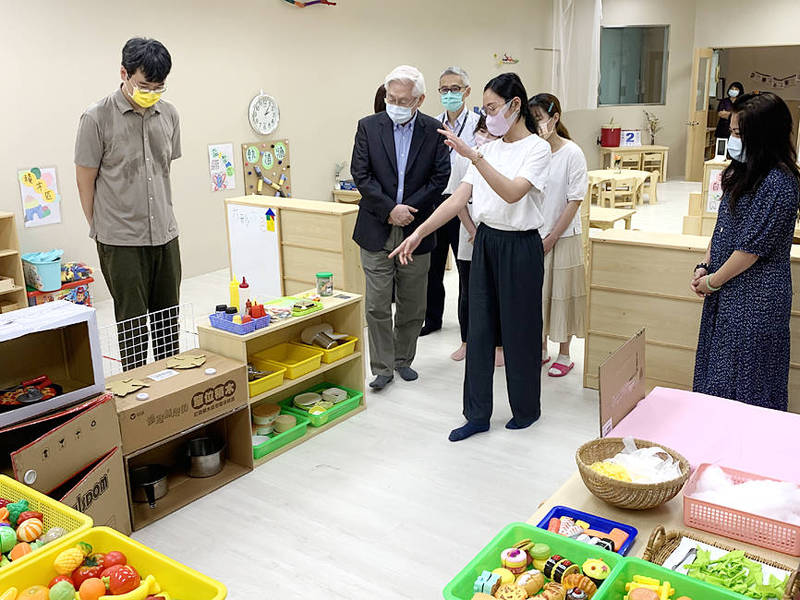《TAIPEI TIMES》 Biomedicine eyed as chief industry of coming decade

Minister of Science and Technology Wu Tsung-tsong, left, visits a childcare center opened by the ministry in Taipei’s Daan District on Monday. Photo courtesy of the Ministry of Science and Technology
By Lin Chia-nan / Staff reporter
Precision medicine is expected to be a flagship industry of the Taiwanese economy in the next decade, as the COVID-19 pandemic has accelerated the digital transformation of local industries, Minister of Science and Technology Wu Tsung-tsong (吳政忠) said yesterday.
Local biomedicine start-ups have over the past few years proved to be innovative, Wu told a news conference in Taipei, adding that the ministry continues to support academics in their efforts to commercialize their innovations.
Quality healthcare and advanced information and communications technologies are among Taiwan’s strengths, creating a conductive environment for the development of smart medicine, and the integration of hospital treatment and home-based healthcare, he said.
At the event, a team of National Taiwan University Hospital’s Yunlin branch and Quanta Computer Inc personnel introduced a distance diagnostic system that would allow doctors to monitor patients’ basic health indicators without meeting them in person.
After local COVID-19 infections surged in the second half of May, the team offered 30 packages of the system to health authorities to use in quarantine facilities, Yunlin branch vice superintendent Matthew Ma (馬惠明) said.
The system is based on artificial intelligence and Internet of Things technology, Quanta Computer business headquarters associate vice president Song Chen-hwa (宋振華) said, adding that the team is looking to promote the system to Taipei Veterans General Hospital and other hospitals.
Other innovations presented at the event included an indoor positioning and tracking system developed by Academia Sinica distinguished visiting chair Jane Liu (張韻詩) and National Yunlin University of Science and Technology associate professor Edward Chu (朱宗賢).
The system, which can track the locations of patients and medical devices, helps patients call for assistance, said Chu, who consults for BiDaE Technology Inc, a start-up founded last year.
A team led by Taipei Medical University professor Chen Ray-jade (陳瑞杰) presented its Contactless Intelligent SafePass Kiosk, which helps people register personal information and contact history by using their National Health Insurance cards.
Chen, who founded the start-up Radica Health in 2019, said that the kiosk is in use in more than 30 hospitals nationwide.
A team led by National Central University professor Lo Men-tzung (羅孟宗) presented a health data monitoring system that helps medical personnel track the health status of patients with chronic conditions remotely.
Many teams started developing their products before the pandemic, Department of Academia-Industry Collaboration and Science Park Affairs Director-General Andrea Hsu (許增如) said.
COVID-19 is a crisis, but it also provides business opportunities for start-ups, she said.
新聞來源:TAIPEI TIMES














